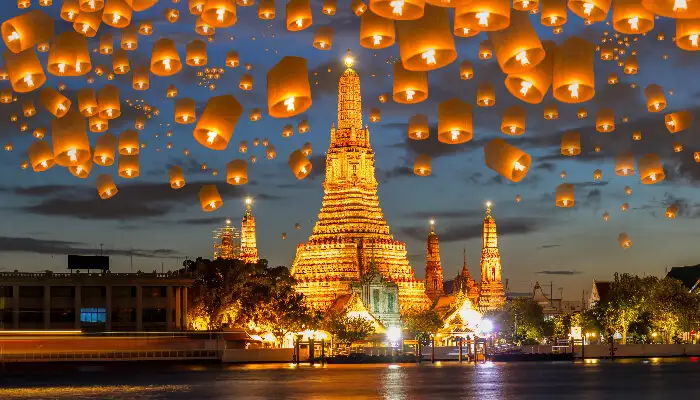Welcome to this blog about the melting pot of Bangkok, a city that celebrates its rich heritage and diversity. In this blog, we will take a closer look at the history and cultural influences that have shaped Bangkok into the vibrant city it is today. From the city’s cultural landmarks and food scene, to its religious communities and celebrations of diversity, we will explore the many different elements that make Bangkok such a unique and special place. So sit back, relax, and join us on a journey through the heart of Bangkok and its rich cultural heritage.
Table of Contents
Introduction to Bangkok’s Rich Heritage
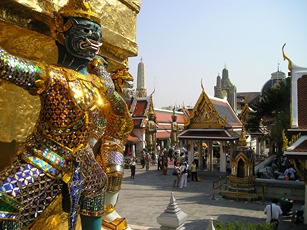
Bangkok, the capital city of Thailand, is a melting pot of cultures, traditions, and religions. From its ancient Buddhist temples to the colorful street markets, Bangkok offers a glimpse into the rich heritage that has shaped the city into what it is today. This vibrant metropolis is home to a diverse population, each with its own unique history, customs, and beliefs. This rich tapestry of cultures has given Bangkok a unique cultural identity that sets it apart from other cities around the world. In this article, we will explore the city’s rich heritage and its diverse cultural influences, and how they have come together to create the vibrant and diverse city that is Bangkok.
The history of Bangkok can be traced back to the late 1700s when King Rama I founded the city and established the Chakri Dynasty. Over the years, the city has grown to become the political, economic, and cultural hub of Thailand. This growth was due to the influx of different ethnic groups, each bringing with them their own traditions and beliefs, contributing to the city’s rich cultural heritage.
One of the most notable cultural influences in Bangkok is the Chinese community, who have been settling in the city since the late 1700s. Their impact can be seen in the city’s bustling street markets, vibrant festivals, and delicious street food. Another significant cultural influence is the Indian community, whose influence can be seen in the city’s delicious curries and vibrant Hindu temples.
The city is also home to a large Muslim community, whose presence can be felt in the city’s many mosques and street food stalls serving traditional dishes. Bangkok’s vibrant Buddhist community is another important aspect of the city’s cultural heritage, with its numerous temples, festivals, and ceremonies.
The city’s cultural diversity is also reflected in its food scene, where traditional dishes from all over the world can be found. From street food stalls serving spicy Thai curries to fine dining restaurants offering international cuisine, Bangkok offers something for everyone.
In conclusion, Bangkok’s rich heritage and cultural diversity make it a unique and vibrant city, with a cultural identity that sets it apart from other cities in the world. From its ancient temples to its bustling street markets, Bangkok is a city that celebrates its cultural diversity, and offers visitors a chance to experience a rich tapestry of cultures, traditions, and beliefs.
The History of Bangkok’s Cultural Diversity
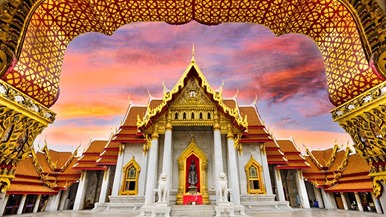
Bangkok’s cultural diversity has been shaped by centuries of immigration and trade, dating back to the late 1700s when King Rama I founded the city and established the Chakri Dynasty. Over the years, different ethnic groups have settled in Bangkok, bringing with them their own unique traditions, beliefs, and cultural practices. This has contributed to the city’s rich cultural heritage and diverse cultural landscape.
One of the earliest groups to settle in Bangkok was the Chinese community. They arrived in the late 1700s as traders and merchants, and their impact on the city can still be seen today in the city’s bustling street markets and vibrant festivals. The Indian community also made its mark on the city, bringing with them their rich culinary traditions, vibrant Hindu temples, and colorful festivals.
Another significant cultural influence in Bangkok is the Muslim community, whose presence can be felt in the city’s many mosques and street food stalls serving traditional dishes. The city’s vibrant Buddhist community is also an important aspect of its cultural heritage, with its numerous temples, festivals, and ceremonies.
In the 19th and 20th centuries, Bangkok experienced a period of rapid growth and modernization, attracting people from all over Thailand and other parts of the world. This growth brought with it new cultural influences, including the arrival of Western travelers and expatriates, who brought with them their own traditions, beliefs, and cultural practices.
Today, Bangkok’s cultural diversity can be seen in its street markets, festivals, food scene, and religious landmarks, where different cultures come together to create a unique cultural identity that sets the city apart from others. This rich heritage and cultural diversity make Bangkok a fascinating destination for travelers and a unique and vibrant city for its residents.
In conclusion, the history of Bangkok’s cultural diversity is a rich and complex one, shaped by centuries of immigration and trade, and the arrival of different ethnic groups. Today, this rich cultural heritage can be seen and experienced in the city’s street markets, festivals, food scene, and religious landmarks, making Bangkok a truly unique and vibrant city.
The Influence of Different Ethnicities in Bangkok
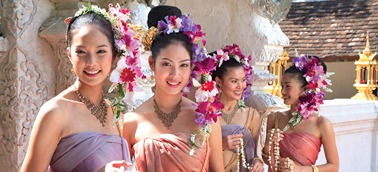
Bangkok’s cultural landscape has been shaped by the influence of different ethnicities, each bringing with them their own traditions, beliefs, and cultural practices. Over the years, these influences have combined to create a rich and diverse cultural heritage that sets the city apart from others.
One of the most notable ethnic groups in Bangkok is the Chinese community, whose impact can be seen in the city’s bustling street markets, vibrant festivals, and delicious street food. From traditional Chinese festivals like the Chinese New Year, to street food stalls serving dim sum and noodle dishes, the Chinese influence is deeply ingrained in the city’s cultural fabric.
The Indian community has also made its mark on Bangkok, bringing with them their rich culinary traditions and vibrant Hindu temples. The city is home to some of the most stunning Hindu temples in Southeast Asia, including the Sri Mariamman Temple, which is dedicated to the Hindu goddess Mariamman.
Another significant cultural influence in Bangkok is the Muslim community, whose presence can be felt in the city’s many mosques and street food stalls serving traditional dishes. The city’s vibrant Buddhist community is also an important aspect of its cultural heritage, with its numerous temples, festivals, and ceremonies.
In recent years, the influence of Western cultures has also become more prevalent in Bangkok, with the arrival of expatriates and tourists from around the world. This has brought with it new cultural practices and beliefs, and has led to the development of a thriving international community in the city.
In conclusion, the influence of different ethnicities in Bangkok has created a rich and diverse cultural heritage that sets the city apart from others. From the bustling street markets to the vibrant festivals, Bangkok is a city that celebrates its cultural diversity and offers visitors a unique cultural experience. Whether you’re a traveler, expatriate, or resident, the cultural influences in Bangkok will leave a lasting impression on you.
Bangkok’s Evolving Food Scene
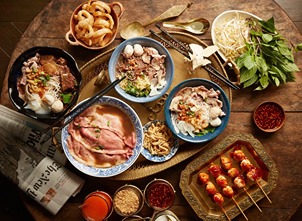
Bangkok’s food scene is constantly evolving, reflecting the city’s rich cultural heritage and diversity. From street food stalls serving spicy Thai curries to fine dining restaurants offering international cuisine, Bangkok offers something for everyone. The city’s food scene has grown and developed over the years, reflecting the influence of different ethnicities and cultural practices.
One of the most notable aspects of Bangkok’s food scene is its street food culture, which is renowned across the world. Street food stalls in Bangkok offer a variety of delicious dishes, ranging from spicy Thai curries to sweet treats like mango sticky rice. The city’s street food culture is a reflection of its cultural diversity, with different ethnicities each bringing their own unique culinary traditions and flavors to the mix.
Another important aspect of Bangkok’s food scene is its fine dining restaurants, which offer a variety of international cuisines, including French, Italian, and Japanese. These restaurants have become increasingly popular in recent years, reflecting the growing influence of Western cultures in the city.
In recent years, Bangkok’s food scene has also been influenced by the rise of health-conscious and sustainable eating, with many restaurants and cafes now offering organic and vegetarian options. This trend reflects the changing attitudes of Bangkok residents towards food and the environment, and is a reflection of the city’s evolving food culture.
In conclusion, Bangkok’s food scene is constantly evolving, reflecting the city’s rich cultural heritage and diversity. Whether you’re looking for street food, fine dining, or healthy and sustainable options, Bangkok has something to offer everyone. The city’s food culture is a reflection of its cultural diversity, and is a testament to the richness and complexity of Bangkok’s cultural heritage.
The Cultural Landmarks of Bangkok
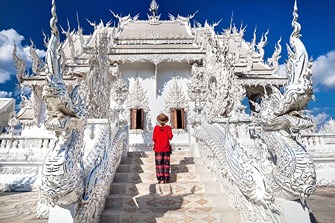
Bangkok is home to a wealth of cultural landmarks that offer a glimpse into the city’s rich heritage and diversity. From ancient temples to modern museums, these landmarks are an essential part of Bangkok’s cultural landscape and offer visitors an opportunity to experience the city’s rich history and traditions.
One of the most notable cultural landmarks in Bangkok is Wat Phra Kaew, also known as the Temple of the Emerald Buddha. This ancient temple is considered the most important Buddhist temple in Thailand and is home to the Emerald Buddha, a revered statue that is said to bring good fortune and prosperity to the country. The temple is also renowned for its stunning architecture and intricate carvings, which offer a glimpse into the rich history and traditions of Thailand.
Another important cultural landmark in Bangkok is the Grand Palace, a stunning complex that was once the official residence of the Thai monarch. The Grand Palace is a beautiful example of Thai architecture, with its intricate carvings, gold-plated roofs, and lush gardens. Visitors to the palace can also see the Wat Phra Kaew Temple, which is located within its grounds.
Another important cultural landmark in Bangkok is the Wat Arun, also known as the Temple of Dawn. This stunning temple is located on the west bank of the Chao Phraya River and is renowned for its towering Khmer-style prangs, which are covered in colorful glass and Chinese porcelain. The temple is also an important spiritual center for Bangkok’s Buddhist community, and is visited by thousands of people every year.
In recent years, Bangkok has also seen the development of modern cultural landmarks, including the Museum of Contemporary Art and the National Museum. These museums offer visitors a chance to experience the city’s rich artistic and cultural heritage, and provide an insight into the city’s contemporary cultural landscape.
In conclusion, Bangkok is home to a wealth of cultural landmarks that offer a glimpse into the city’s rich heritage and diversity. From ancient temples to modern museums, these landmarks are an essential part of Bangkok’s cultural landscape and offer visitors an opportunity to experience the city’s rich history and traditions. Whether you’re a history buff, an art lover, or simply a curious traveler, the cultural landmarks of Bangkok are not to be missed.
Bangkok’s Celebrations of Diversity
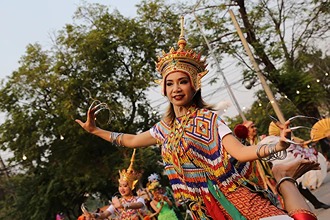
Bangkok is a city that celebrates its diversity, with a variety of cultural festivals and events taking place throughout the year. These events bring the city’s diverse communities together and offer an opportunity for visitors to experience the rich cultural heritage of Bangkok.
One of the most notable celebrations of diversity in Bangkok is the Chinese New Year festival, which is held every year in January or February. This festival is celebrated by the city’s large Chinese community and is marked by a range of cultural events, including parades, dragon dances, and traditional food stalls.
Another important celebration of diversity in Bangkok is the Songkran Festival, which marks the Thai New Year. This festival is held in April and is celebrated with a range of events, including water fights, processions, and traditional Buddhist ceremonies. Songkran is a celebration of Thai culture and heritage, and is an opportunity for the city’s residents to come together and celebrate the start of the new year.
Another important cultural celebration in Bangkok is the Loy Krathong Festival, which is held every year in November. This festival is marked by the floating of traditional Krathong boats on rivers and lakes, and is a celebration of the beauty and power of water. The festival is also a time for making wishes and giving thanks for the blessings of the previous year.
In recent years, Bangkok has also seen the development of new cultural festivals, including the Bangkok International Film Festival and the Bangkok International Fashion Week. These events reflect the city’s growing cultural scene and its commitment to celebrating its diverse communities.
In conclusion, Bangkok is a city that celebrates its diversity, with a variety of cultural festivals and events taking place throughout the year. These events bring the city’s diverse communities together and offer an opportunity for visitors to experience the rich cultural heritage of Bangkok. Whether you’re interested in traditional cultural celebrations or modern cultural events, Bangkok has something to offer everyone.
The Role of Religion in Bangkok’s Cultural Mix
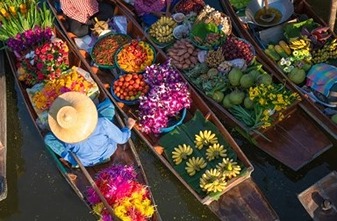
Religion plays a significant role in Bangkok’s cultural mix, with a variety of religious communities coexisting in the city. This diversity of religion has helped to shape Bangkok’s cultural landscape and has contributed to the city’s rich heritage and traditions.
One of the most prominent religions in Bangkok is Buddhism, which is the main religion of Thailand. Buddhism has a strong influence on Thai culture and is reflected in the city’s many Buddhist temples and shrines. Wat Phra Kaew and Wat Arun are two of the most notable Buddhist temples in Bangkok, and are popular tourist destinations due to their stunning architecture and spiritual significance.
Another important religion in Bangkok is Islam, which is practiced by a significant minority of the city’s residents. This community is particularly evident in areas such as Chinatown, where there are several mosques and Islamic cultural centers. The city’s Muslim community celebrates a range of religious festivals and events, including Eid al-Fitr and Eid al-Adha, which are an important part of Bangkok’s cultural landscape.
Hinduism and Christianity are also practiced in Bangkok, and there are several temples, churches, and other religious centers that cater to these communities. These religious communities contribute to the city’s diverse cultural landscape and help to create a rich tapestry of cultures and traditions.
In conclusion, religion plays a significant role in Bangkok’s cultural mix, with a variety of religious communities coexisting in the city. This diversity of religion has helped to shape Bangkok’s cultural landscape and has contributed to the city’s rich heritage and traditions. Whether you’re a spiritual traveler or simply interested in exploring different cultures and beliefs, Bangkok has much to offer.
The Importance of Preservation of Bangkok’s Heritage
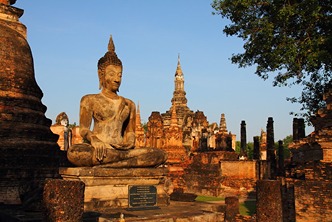
The preservation of Bangkok’s heritage is of great importance, as it helps to preserve the city’s rich cultural history and traditions. Bangkok is home to a wealth of cultural landmarks and cultural heritage sites, including temples, palaces, and museums, and these sites play a crucial role in maintaining the city’s cultural identity.
One of the key challenges in preserving Bangkok’s heritage is the city’s rapid development and modernisation. As the city grows and expands, there is a risk that many of its cultural landmarks and heritage sites could be lost. This is why the preservation of Bangkok’s heritage is so important, as it helps to ensure that the city’s cultural history and traditions are not forgotten.
The government of Thailand has taken a number of steps to preserve Bangkok’s heritage, including the creation of heritage conservation zones and the development of cultural heritage tourism. These initiatives aim to promote the preservation of the city’s cultural landmarks and heritage sites, and encourage the development of sustainable tourism practices.
There is also a growing awareness among Bangkok’s residents of the importance of preserving their city’s heritage. Many local community groups and cultural organizations are working to promote the preservation of the city’s cultural landmarks and heritage sites, and are actively advocating for their protection.
In conclusion, the preservation of Bangkok’s heritage is of great importance, as it helps to preserve the city’s rich cultural history and traditions. Whether you’re a local resident or a visitor to the city, it is important to understand the significance of Bangkok’s cultural heritage and to support the efforts to preserve it for future generations.
The Future of Bangkok’s Cultural Diversity
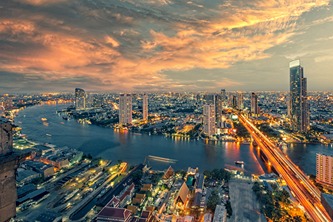
The future of Bangkok’s cultural diversity looks bright, as the city continues to evolve and embrace new cultures and traditions. Despite the challenges posed by rapid development and modernisation, Bangkok’s diverse cultural mix remains an integral part of the city’s identity.
One of the key factors that will shape the future of Bangkok’s cultural diversity is the city’s growing international profile. As Bangkok becomes increasingly connected to the rest of the world, it is likely that the city will continue to attract people from diverse cultural backgrounds, further enriching its cultural landscape.
Another important factor that will shape the future of Bangkok’s cultural diversity is the city’s expanding tourism industry. Bangkok is one of the world’s most popular tourist destinations, and the city’s diverse cultural offerings, including its rich heritage and food scene, are a major draw for visitors. This growing tourism industry is likely to drive further growth and development in the city’s cultural sector, further enriching Bangkok’s cultural landscape.
The city’s younger generations also play a crucial role in the future of Bangkok’s cultural diversity. As they grow up in a rapidly changing world, they are likely to bring new ideas, perspectives, and cultural influences to the city. This will help to keep Bangkok’s cultural landscape fresh and vibrant, and will help to ensure that the city remains a melting pot of cultures and traditions.
In conclusion, the future of Bangkok’s cultural diversity looks bright, as the city continues to evolve and embrace new cultures and traditions. Whether you’re a local resident or a visitor to the city, it is exciting to see the rich cultural landscape of Bangkok continue to thrive and evolve.
Conclusion: The Melting Pot of Bangkok, a Unique Cultural Experience
In conclusion, Bangkok is a true melting pot of cultures and traditions, a unique and dynamic city that celebrates its rich heritage and diversity. From its rich history and cultural landmarks, to its evolving food scene and vibrant religious communities, Bangkok is a city that truly embraces its cultural heritage.
The preservation of Bangkok’s heritage is of great importance, as it helps to ensure that the city’s cultural history and traditions are not forgotten. With the continued growth and development of the city, it is important that efforts are made to protect and preserve its cultural landmarks and heritage sites.
The future of Bangkok’s cultural diversity looks bright, with the city poised to continue embracing new cultures and traditions. Whether you’re a local resident or a visitor to the city, a trip to Bangkok offers a unique and immersive cultural experience, one that will leave you with a deeper appreciation of the city’s rich heritage and diversity.
So if you’re looking for a city that truly celebrates its cultural heritage, then look no further than Bangkok, the melting pot of cultures and traditions. Whether you’re interested in exploring the city’s religious communities, admiring its cultural landmarks, or simply indulging in its diverse food scene, Bangkok has something for everyone.
In conclusion, the melting pot of Bangkok is truly a testament to the city’s rich heritage and diversity. If you’re interested in learning more about the city’s history, be sure to check out our previous blog on ‘Exploring the Rich History of Bangkok: A Journey Through Time‘ for an in-depth look at how Bangkok has evolved over the years.
Q. What are the things that Bangkok is famous for?
Bangkok, the capital city of Thailand, is known for its rich cultural heritage, vibrant street life and famous landmarks such as the Grand Palace, Wat Arun (Temple of Dawn) and Wat Phra Kaew (Temple of the Emerald Buddha). It is also a popular tourist destination for its bustling street markets, street food, and thriving nightlife.
Q. Is Bangkok a suitable destination for a family trip?
Yes, Bangkok can be a great destination for a family trip. It offers a wide range of family-friendly activities and attractions, such as visiting cultural and historical sites, exploring amusement parks and zoos, and indulging in delicious Thai cuisine.
Q. What steps should one take to plan a family trip to Bangkok?
When planning a family trip to Bangkok, it is important to research and book suitable accommodations, consider the preferences and needs of all family members, and make a schedule to balance both leisure and sightseeing activities. It’s also advisable to plan for transportation and budget for meals, attractions and shopping.
Q. What are the reasons to go to Bangkok?
Bangkok offers a unique blend of ancient cultural heritage and modern city life, making it a popular tourist destination. Visitors can experience its rich history through landmarks such as the Grand Palace, Wat Arun and Wat Phra Kaew, as well as its bustling street markets, delicious street food and thriving nightlife.
